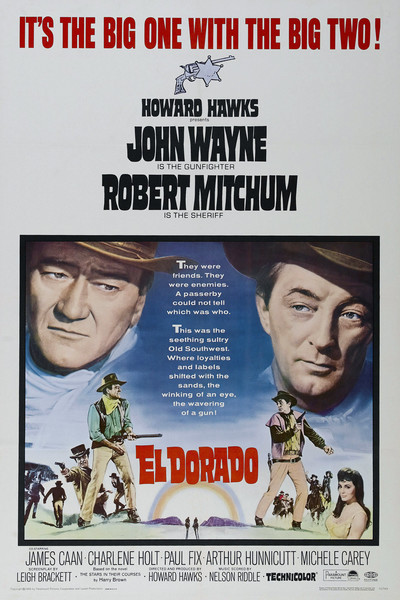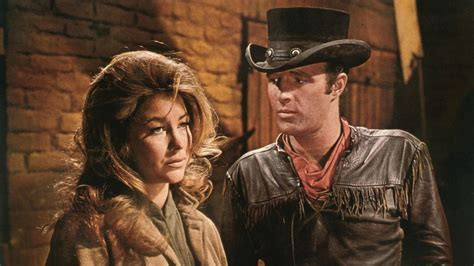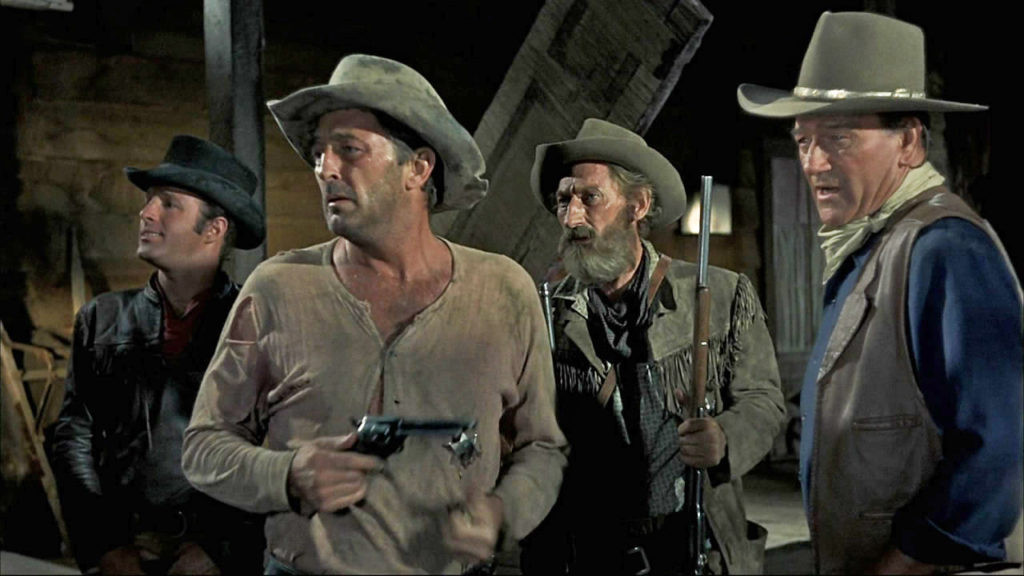El Dorado, a 1967 Western directed by the legendary Howard Hawks and starring the iconic John Wayne, often finds itself in the shadow of Rio Bravo, a film sharing striking similarities. While the original article from johnchen.net expressed a personal preference for El Dorado over Rio Bravo, let’s delve deeper into what makes this John Wayne movie a standout in its own right. We’ll explore the compelling performances, clever script, and enduring themes that elevate El Dorado beyond a simple rehash, solidifying its place as a beloved classic for fans of John Wayne and the Western genre.

The promotional poster for El Dorado in 1967, while criticized for its crowded design and suggestive tagline, ultimately couldn’t diminish the film’s appeal. Despite its shortcomings as a piece of marketing, the poster serves as a time capsule, hinting at the star power and action within. Thankfully, the movie itself delivers far more than the poster promises, offering a rich cinematic experience that has resonated with audiences for decades.
A Western in the Hawksian Tradition: More Than Just Rio Bravo Revisited
It’s undeniable that El Dorado shares DNA with Rio Bravo. Both films, directed by Howard Hawks and featuring John Wayne, revolve around a sheriff and his deputies defending against a siege. However, to simply label El Dorado as a lesser Rio Bravo is to overlook its unique merits. El Dorado carves its own path by emphasizing character dynamics and humor, creating a film that is arguably more accessible and enjoyable for a broader audience.
John Wayne embodies Cole Thornton, an aging gunfighter hired by a ruthless cattle baron, Bart Jason (Ed Asner), to intimidate a family of ranchers. Thornton, however, possesses a moral compass and a history with Sheriff J.P. Harrah (Robert Mitchum). Wayne portrays Thornton with a nuanced blend of weariness and capability, showcasing the “old Duke” charm that many fans cherish. He’s not just a gunslinger; he’s a man grappling with his past and choosing his own code of honor.
Robert Mitchum delivers a memorable performance as Sheriff Harrah, initially depicted as a broken man battling alcoholism. Mitchum masterfully portrays Harrah’s descent and eventual redemption, adding a layer of pathos and depth to the narrative. His scenes with Wayne are particularly compelling, filled with a camaraderie forged in shared history and mutual respect.
The Spark of Youth: James Caan and Michele Carey
While Wayne and Mitchum provide the seasoned gravitas, the younger cast members inject El Dorado with energy and vibrancy. James Caan, as Mississippi, the knife-throwing young gunfighter, is a revelation. His portrayal is charismatic and quirky, providing much of the film’s humor and heart. Mississippi’s unwavering loyalty to Thornton and his unconventional fighting style make him an unforgettable character. Caan’s performance in El Dorado is often cited as a career highlight, showcasing his raw talent before he reached superstardom.
Michele Carey as Josephine “Joey” McDonald adds another layer of dynamism. Joey is not a damsel in distress; she’s brave, resourceful, and fiercely protective of her family. Carey’s portrayal is both spirited and vulnerable, making Joey a compelling female character in a male-dominated genre. Her interactions with both Wayne and Caan are memorable, adding romantic undertones and further enriching the film’s ensemble dynamic.

Michele Carey and James Caan bring youthful energy and compelling performances to El Dorado, complementing the seasoned leads. Their characters, Joey McDonald and Mississippi, are integral to the film’s charm and appeal.
Leigh Brackett’s Witty Script: Dialogue and Camaraderie
The screenplay by Leigh Brackett is a cornerstone of El Dorado‘s success. Brackett, a celebrated science fiction writer and screenwriter, crafts dialogue that is sharp, witty, and character-driven. The conversations flow naturally, enhancing the on-screen chemistry between the actors, especially Wayne and Mitchum, and Wayne and Caan.
The humor in El Dorado is more pronounced than in Rio Bravo, and Brackett’s script skillfully weaves it into the narrative without undermining the dramatic tension. The banter between characters, particularly the lighthearted exchanges even in tense situations, contributes significantly to the film’s enjoyable tone. Brackett’s writing emphasizes the relationships and camaraderie, making the characters feel relatable and their bonds believable.
Friendship and Loyalty: The Heart of El Dorado
At its core, El Dorado is a celebration of friendship and loyalty. The film explores the bonds between men in the face of adversity, highlighting themes of camaraderie and mutual support. Cole Thornton’s decision to side with Sheriff Harrah over Bart Jason is rooted in their long-standing friendship. The evolving relationship between Thornton and Mississippi, and the unwavering loyalty of Bull (Arthur Hunnicutt) further underscore this central theme.
El Dorado presents an idealized vision of male friendship, where loyalty and shared values trump personal gain. This theme resonates deeply with audiences, contributing to the film’s enduring appeal. The willingness of these men to stand together against injustice, simply because they value their relationships and believe in doing what’s right, is a powerful and timeless message.

The quartet of friends – Mississippi, J.P. Harrah, Bull, and Cole Thornton – embodies the central theme of friendship in El Dorado. Their camaraderie and loyalty are tested as they face overwhelming odds together.
John Wayne in His Element: The Maturing Western Star
By 1967, John Wayne was entering a new phase in his career, often referred to as his “elderly period.” El Dorado showcases Wayne not as the young, virile hero, but as a seasoned, experienced man, still capable but also willing to acknowledge his limitations and rely on others. This portrayal resonated with audiences as Wayne matured on screen, reflecting his own aging persona.
El Dorado allows Wayne to display a broader emotional range. He’s genial and grumpy, tough yet vulnerable, and still capable of romantic charm. This era of Wayne’s career produced some of his most memorable roles, and El Dorado is a prime example of his enduring appeal and evolving screen presence. Just two years later, Wayne would win his only Oscar for True Grit, further solidifying his legacy as a Western icon.
El Dorado’s Enduring Legacy: A Classic Revisited
El Dorado was a box office success upon its release and has only grown in stature over time. Despite the inevitable comparisons to Rio Bravo and its thematic successor, Rio Lobo, El Dorado stands firmly on its own merits. Its availability on DVD, Blu-ray, streaming services, and frequent television airings ensures its continued relevance for new generations of viewers.
If you’re seeking a classic Western that blends action, humor, and heart, El Dorado is an excellent choice. It’s a testament to the enduring appeal of John Wayne, the directorial prowess of Howard Hawks, and the timeless themes of friendship and loyalty. Whether you’re a long-time fan or new to the genre, El Dorado promises an engaging and thoroughly enjoyable cinematic experience.
Similar films that capture the spirit of adventure and camaraderie found in El Dorado include The Magnificent Seven, Hatari!, The Professionals, Silverado, Gunga Din, Butch Cassidy and the Sundance Kid, and, of course, Rio Bravo. Exploring these films alongside El Dorado provides a richer appreciation for the Western genre and its enduring themes.
